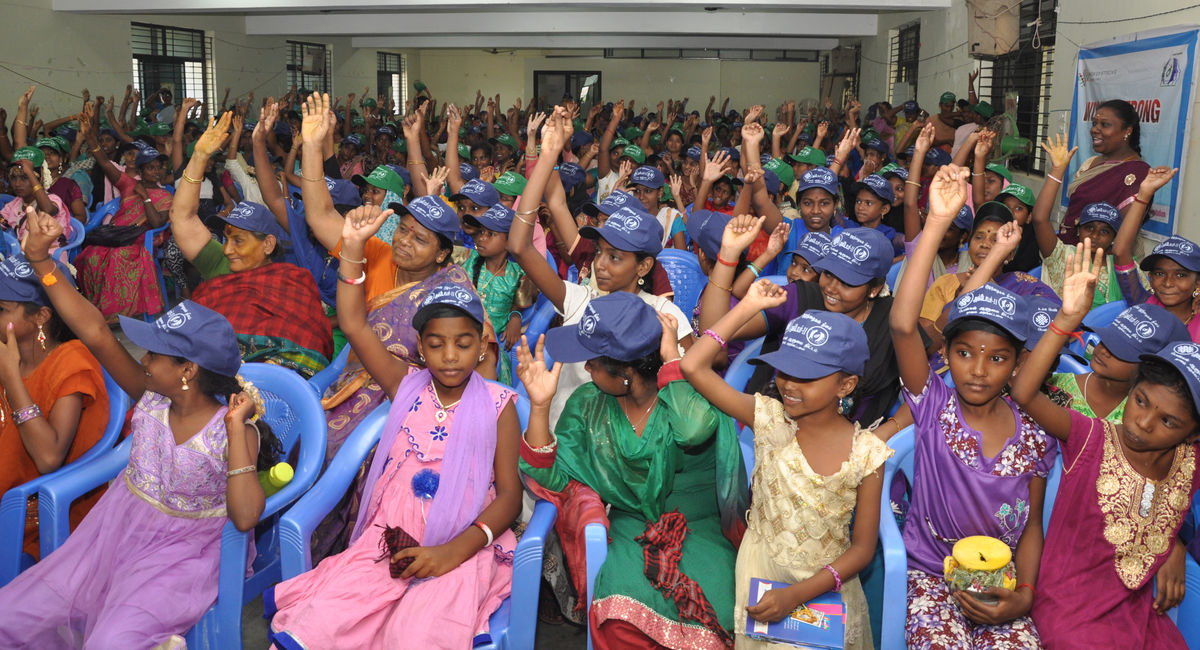The Power of Girls Together: How Girls’ Clubs Transform Lives

For girls to thrive, they need a good education. Finishing school allows girls to grow into women who are able to earn more, make more responsible decisions throughout their lives, and benefit their families and communities in lasting ways.
Through our Consortium member organizations, WomenStrong International works around the world with women and girls who face uniquely complex challenges to completing school. We provide resources, including the creation of Girls’ Clubs, to help girls overcome these obstacles to completing their schooling and to leading more fulfilled lives.
Girls’ Clubs are held in safe environments where young girls can connect with their peers, share their stories, and learn from each other and from adult mentors. From India and Kenya, westward to Ghana and Haiti, our Clubs bring girls together to share information that can empower them to stay in school, complete their education, and become the best women they can be.
WomenStrong International serves as a facilitator, advisor, and convener for our Consortium members and their Girls’ Clubs. Together, we’ve helped thousands of young women become more confident, better informed on how to protect themselves from sexual violence and abuse, and more knowledgeable about their own bodies. In the coming months, we’ll be sharing what we’ve learned, including a full Girls’ Clubs curriculum, with the goal of helping others create and manage their own Girls’ Clubs.
Discovering Why Girls Abandon Education
A staggering 130 million girls are not in primary or secondary school, according to the Brookings Institution . This challenge remains a top priority across our global Consortium. Alice Visionary Foundation Project (AVFP) in Kenya, Women’s Health to Wealth (WHW) in Ghana, and H.O.P.E. in Haiti found that a dangerous lack of resources and information on girls’ own bodies put them at risk of dropping out — and of violence.
For instance, girls struggled in the classroom during their periods, due to a near-universal lack of safe, sex-segregated bathroom facilities and sanitary hygiene products. Many girls did not have basic information about sex, puberty, and reproductive health (topics viewed as taboo), making young girls more vulnerable to infection, illness, and abuse. With all this in mind, WomenStrong’s Consortium members have made it their mission to focus on building girls’ confidence, self-esteem, relationships and leadership skills, as well as their knowledge on wholly natural sexual and reproductive processes.
The adults running our Girls’ Clubs create powerful connections with Club members, offering help and support at times when they need it the most. WHW Girls’ Club Facilitators pay special attention to their girls’ attendance and have numerous counseling resources in place to keep them in school, and, in some cases, to help them return to school. Similarly, AVFP’s Education Coordinator follows up with girls who have recently dropped out to discuss their future options and to encourage them to return to school. Girls’ Club sessions themselves often feature activities and discussions that inspire girls to continue their schooling and discover where their career passions lie.
We have already seen lives changed. In Ghana, 16-year-old Nancy , a young teen mom, received intensive counseling and information sessions through a Girls’ Club and ultimately decided to go back to school after giving birth. In Kenya, Girls’ Clubs have empowered hundreds of young women by imparting usable knowledge and inspiring the girls’ own confidence to dream about excelling at and pursuing leadership roles in government, math, and science.
Teaching Girls Steps for Healthier, Financially Liberated Lives
In India, the incredible work of WomenStrong Consortium member DHAN Foundation had already helped thousands of women lift themselves out of extreme poverty through microfinance self-help groups that became vehicles for broad social development, which included health care, insurance, and skills-building. DHAN wished to create a similar model for girls.
Although the Indian Government provides free education through 10th grade, the benefits did not flow equally to girls and boys. When DHAN applied a critical eye to what was keeping young girls out of school, they found gender discrimination at the heart of the matter. Girls’ education is frequently not considered a priority; sons receive preference in the family in a variety of the most basic ways. Boys tend to be fed better than girls, and less nutrition leads to a shockingly high prevalence of anemia among adolescent girls. Malnourished, severely anemic girls simply don’t have the focus and energy for school.
Working with WomenStrong International, DHAN established Girls’ Clubs in the city of Madurai with the goal of improving health and economic wellbeing. Within a few months of establishing the first Girls’ Clubs, DHAN screened more than 4,200 girls for anemia and found 87.5% of the young women suffered from it. DHAN responded by providing iron-folic acid tablets, hospitalized the most severe cases for treatment, and began educating girls and their families on anemia and nutrition.
True to its expertise in development and microfinance, DHAN recently organized a festive rally to introduce their Girls’ Clubs to the group savings programs that had already helped their mothers. In addition to the girls’ weekly Club meetings, they participate in monthly meetings that teach vital lessons about financial literacy, such as the enormous impact of saving even very small amounts. The girls in the Madurai Clubs are part of DHAN’s broader group of more than 200,000 girls in Clubs across seven Indian states. Over the next five years, DHAN plans to reach more than a million adolescent girls.
By connecting young women with Girls’ Clubs, our Consortium sites help create a generation empowered with greater self-confidence, stronger leadership skills, and the courage to reach promising new horizons. Visit our Education Campaign landing page for more information on our Girls’ Clubs — and how you can help.

